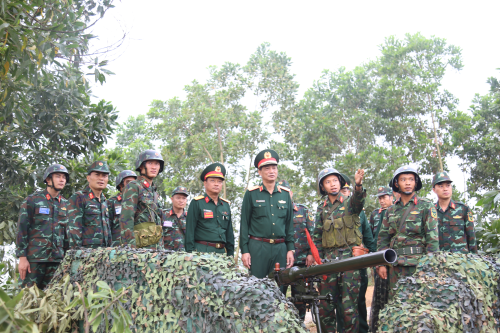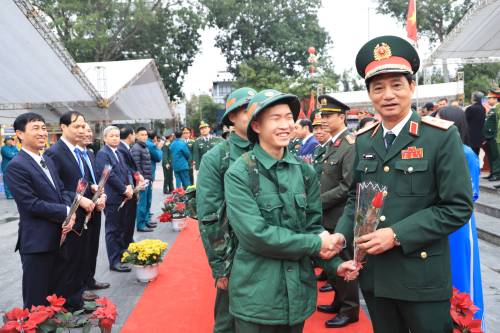Bringing into play the tradition of Dien Bien Phu, armed forces of Military Region 2 focus on raising their synergy and combat power
The Victory of Dien Bien Phu represents an epoch-making victory of profound historical value; it is the victory of Vietnam’s willpower, knowledge, and strength under the leadership of the Party and President Ho Chi Minh. It proves the robust development of our Army, including the Northwestern armed forces. Bringing into play that tradition, Military Region 2’s armed forces concentrate on raising their synergy and combat power to meet the requirements set by Fatherland protection in the new situation.
 |
| Commander of Military Region 2 inspects a unit during TM-23 exercise |
Military Region 2’s armed forces were formed and developed from the masses’ revolutionary movement. Being led, directed, educated, and trained by the Party Central Committee and President Ho Chi Minh, particularly the Central Military Commission (CMC) and the Ministry of National Defence (MND), being loved and sheltered by party committees, authorities, and ethnic people of the Northwestern region, Military Region 2’s armed forces have unceasingly matured and achieved a lot of brilliant feats of arms, thereby bolstering the glorious tradition of the Northwestern armed forces and heroic Vietnam People’s Army.
Immediately after being established, units of War Zone 10 (the forerunner of Military Region 2) quickly stabilised their organisational structure and joined the Vietnamese people and troops in the resistance war against the French; taking part in hundreds of battles and campaigns, they destroyed a large number of enemy troops and means of war, liberated a large area (28,500 km2) with a population of over 250,000, and gloriously fulfilled the international task in Laos, thus leading to the dispersion of French forces. Feats of armed gained by the Northwestern people and troops laid an important foundation for the Party Central Committee and the General Military Commission to decide to launch the strategic decisive battle of Dien Bien Phu.
During the Winter – Spring Offensive of 1953 – 1954, particularly Dien Bien Phu Campaign, the Military Region’s armed forces were assigned to work with our main force to annihilate an important section of enemy troops on the perimeter, destroy bandit groups, ensure traffic, guide our main units, and cooperate with Northwestern ethnic people in building roads for the deployment of artillery, shooting enemy aircraft, protecting key traffic lines, and maintaining logistics support for the Campaign. After 56 days and nights of courageous, ingenious, creative combat, the Military Region’s armed forces together with the people and troops across the country completely destroyed the heavily fortified base of Dien Bien Phu, making up the Victory that “resounded the five continents, shook the globe”, forcing the French to sign Geneva Accords on ending the war in Indochina, liberating the North, laying a solid foundation for the liberation of the South and national unification, taking the whole country to socialism.
 |
| Military Region 2’s Command encourages newly conscripted soldiers of Phuc Yen city |
Currently, the situation on global and regional scales has rapid, complex, unpredictable developments; our country both has advantages and faces difficulties and challenges. Within the Military Region’s area of responsibility, hostile forces continue stepping up their sabotage and undermining the national great unity block, while rural security in some localities tends to be complicated, thus negatively impacting on the performance of military-defence tasks. Bringing into play the spirit of Dien Bien Phu Victory, the Military Region’s armed forces will focus on making themselves comprehensively strong with a high level of synergy and combativeness to deserve to be an absolutely loyal, reliable political and combat army of local party committees, authorities, and people.
First of all, concentrating on making the Military Region’s armed forces strong in terms of politics, ideology, morality, organisation, and personnel. During Dien Bien Phu Campaign, one of the important factors in our epoch-making Victory was building a politically, ideologically, organisationally strong Army absolutely loyal to the Party, State, and people, ready for fighting, sacrificing, and defeating all foreign invaders. Following that glorious tradition, the Military Region’s Party Committee and Command will direct affiliated offices and units to grasp resolutions and directives by the Party Central Committee, the CMC, the MND, and the Military Region on military-defence work and render their cadres and soldiers fully aware of partners and opponents, hostile forces’ plots and artifices, and the impacts made by the situation on the protection of the Military Region’s area and the Fatherland. Directives, guidance, and projects by higher echelons on political and ideological education will be effectively realised, with a focus on raising the quality of political education and legal propagation, dissemination, and education for troops, closely combining education with the Determined to Win Emulation Movement and campaigns, particular the Campaign “promoting tradition, devoting talent, deserving to be Uncle Ho’s soldiers” in the new era. All cadres and soldiers within the Military Region must always have political steadfastness, remain vigilant, and actively, proactively combat hostile forces’ “peaceful evolution” strategy.
The Military Region will grasp and seriously implement resolutions and directives on Party building and the example-setting responsibility of cadres and party members as well as regulations on “things that Party members must not do”. It will direct party committees and organisations at all levels to adhere to rules for Party meeting and organisation, renew their leadership and management methods, enhance the management and training of party members, and align the building of a contingent of cadres and party members with the building of pure, strong party organisations and “typically, exemplarily” comprehensively strong offices and units.
Second, raising the quality of training, exercises, and combat readiness. The strength of our armed forces during Dien Bien Phu Campaign was created by various elements, including the quality of training and the observance of the combat motto of “steady attack, steady advance”. Bringing into play that valuable lesson, the Military Region’s Party Committee and Command will direct offices and units to grasp and seriously implement higher echelons’ resolutions and directives on training, exercise, and combat readiness. Emphasis will be placed on making preparation for training, encouraging self-study and self-improvement among cadres, particularly cadres in charge of training work, platoon cadres, and new graduate cadres, and organising synchronous, specialised training relevant to combat reality under the motto, viewpoints, principles, and connections set for training work. Great value will be attached to training troops to use new weapons and equipment, organising night-time, manoeuvre, and field training activities, and applying information technology and simulation technology to training, exercises, and competitions. The Military Region will direct its Military School to raise the quality of education and training in line with practical activities of offices and units and step up the teaching of foreign languages and ethnic minority languages for cadres and soldiers. All cadres must be capable of carrying out training work at their level, while 90% of cadres at battalion level and 80% of cadres at company and platoon levels must achieve merit or distinction in this work. Due attention will be paid to enhancing inspection, re-examination, and unplanned inspection of training work, completely dealing with weaknesses in training, and taking the results of this work as a basic criterion for the assessment and appointment of cadres and party members.
Third, cooperating with localities in well performing military-defence work, protecting the area, creating a favourable condition for socio-economic development, improving the people’s living standards. During Dien Bien Phu Campaign, the provincial armed forces of Yen Bai, Lao Cai, Lai Chau, and Son La were not directly involved in combat, but they played an important role in mobilising the people, building bases, training key cadres, actively destroying bandit groups, ensuring the smooth flow of traffic, and providing human and material resources for the Campaign. Learning from that lesson, the Military Region’s Party Committee and Command will closely work with provinces to direct departments, sectors, unions, and localities to grasp and effectively implement the Resolution of the 13th Party Central Committee’s 8th Plenum on the Strategy for Fatherland protection in the new situation and other documents on building defensive zones, raise the quality of military-defence work, well carry out national target programs, and combine defence with economic development within the Northwestern region. Consideration will be given to mobilising and employing resources to develop potential and build provincial defensive zones, Military Region-level defence, the system of headquarters within all-level combat bases, and training grounds in a synchronous, inter-connected, solid manner. Due regard will be paid to constructing and consolidating offices of commune-level military boards and border communes’ key militia positions under the approved planning and road map.
The Military Region will direct all-level military agencies to work with sectors and organisations, particularly the Public Security Force and the Border Guard Force to assist local authorities in raising the quality of combat readiness, training work, defensive zone exercises, and civil defence. The Military Region will step up defence and security education, particularly for the 3rd and 4th groups of learners and religious dignitaries as the basis for building a firm “posture of people’s hearts and minds”. Significance will be attached to building and improving the militia and self-defence force and the reserve force, developing Party membership within those forces in accordance with the particularities of each locality, and well performing conscription work. The Military Region will closely cooperate with provinces in recommending ministries and central sectors to settle issues relating to national defence land.
Fourth, continuing to build “elite, compact, strong” armed forces of the Military Region. Due to the special importance of Dien Bien Phu Campaign, the Politburo and the General Military Commission decided to concentrate our forces on this strategic decisive battle to guarantee a victory according to instructions given by President Ho Chi Minh to General Vo Nguyen Giap. Bringing into play that spirit, the Military Region will direct its affiliates, particularly offices and units which will be merged or re-organised to continue grasping and realising higher echelons’ documents on building an “elite, compact, strong” Army in accordance with their functions and tasks. To that end, there must be proper steps and road map; this work must be placed under party committees’ close, focalised, uniform leadership and direction. Priority must be given to ensuring the number of troops for units tasked with combat readiness and full-strength infantry regiments and divisions. Offices and units must quickly stabilise the structure of their party organisations, commands, and mass organisations to avoid disrupted leadership and direction. Offices and units must also opportunely adjust their combat plans and disposition of forces and means to meet the new requirements set by training, exercises, and combat readiness. The Military Region will organise professional training courses for redundant personnel before deploying them to new offices and units. Besides, preparations will be actively made to merge Logistics Department with Technical Department into Logistics – Technical Department.
Fifth, synchronously, drastically adopting measures for regularity building and discipline management. During Dien Bien Phu Campaign, participating forces adhered to directives of the Campaign’s Party Committee and Command on shifting the combat motto from “rapid attack, rapid victory” to “steady attack, steady advance” as an important factor in the historic Victory. Following that tradition, the Military Region will direct offices and units to grasp and seriously implement directives, guidance, and regulations on discipline management. Due attention will be paid to stepping up measures to train and manage troops, create a positive change in discipline management, and multiply role models in regularity building across the Military Region. Importance will be attached to promoting the role of party committees, commands, commissars, and organisations in discipline management, encouraging self-discipline among all troops, minimising trivial violations of discipline, and preventing serious violations of discipline from happening. Last but not least, preliminary and final reviews will be regularly conducted to draw lessons on discipline management as the basis for raising the synergy and combat power of the Military Region’s armed forces in the new period.
Lt. Gen. PHAM HONG CHUONG
Commander of the Military Region